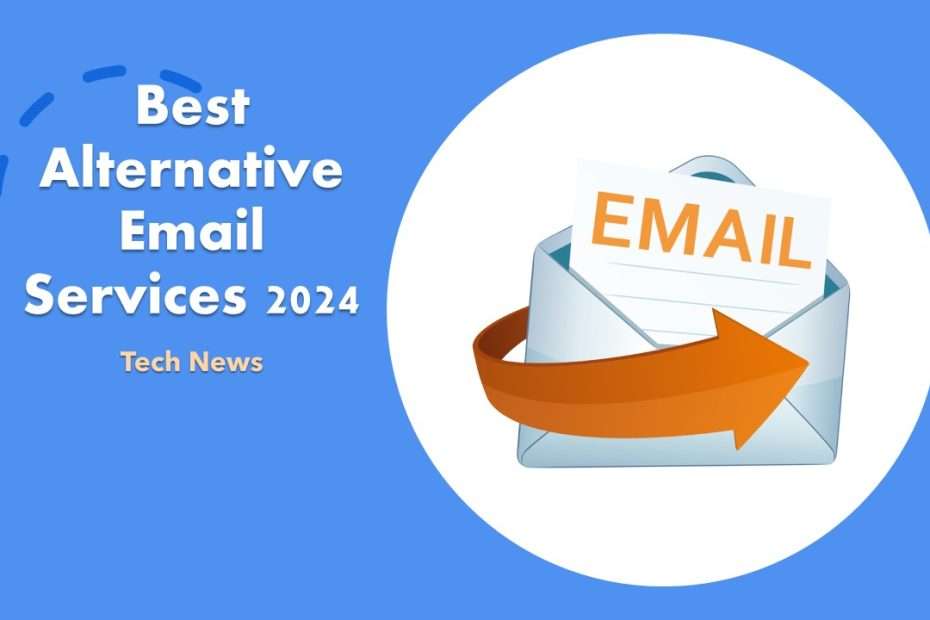In today’s digital age, where data breaches and privacy concerns are on the rise, securing your communications has become increasingly important. With the average person spending hours managing their work and personal email daily, choosing the right email provider is crucial. It’s essential to opt for a service that prioritizes encryption and privacy to safeguard your sensitive information. In this article, we delve into the realm of secure email providers, presenting the top 10 options available. We also provide insights into essential factors to consider, guiding you in selecting the best provider that aligns with your specific needs.
When exploring secure email options, it’s vital to be aware of various factors that contribute to a provider’s trustworthiness. Encryption standards, privacy policies, and user-friendly interfaces all play crucial roles in determining the effectiveness of a secure email service. Additionally, considering features like two-factor authentication and data storage practices can further enhance your overall security. By evaluating these factors, you can make an informed decision that not only safeguards your communications but also aligns with your preferences and requirements. Stay informed and prioritize your digital security with the right secure email provider.
Big-name email services invest significant resources in security measures, but their prominence makes them attractive targets, leaving them susceptible to cyber threats. A notable incident involved hackers effortlessly compromising thousands of Microsoft Exchange email servers, underscoring the vulnerability of such widely used platforms. Opting for a smaller, less well-known email service may offer enhanced security, as these providers often escape the widespread attention that larger services attract, making them less appealing targets for potential cyber attacks.
Despite the potential risks associated with mainstream email services, there is a straightforward solution to bolster your email security – transitioning to a secure email provider that prioritizes and respects your privacy. By making this shift, you gain control over your digital communication environment, ensuring a heightened level of protection for your sensitive information. Secure email providers often implement robust encryption practices and stringent privacy policies, contributing to a safer and more confidential email experience. Consider this proactive step as an effective means to fortify your email security and safeguard your online communications.
When it comes to secure email services, the diverse needs of users result in various preferences, making it challenging to identify a one-size-fits-all solution. Individuals have distinct priorities, with some emphasizing maximum security and robust encryption, while others prioritize convenience and user-friendly applications across different devices. Recognizing these differences, there is a range of solid choices available to cater to the specific requirements of different users. Whether you’re seeking heightened security measures or a seamless, user-friendly experience, the landscape of secure email services offers options that align with your priorities.
Our top recommendations for secure email services encompass a variety of features and strengths to cater to the diverse preferences of users. From services that excel in providing maximum security and encryption to those offering convenience and simplicity through user-friendly applications, the choices abound. Each recommendation reflects a commitment to addressing the unique needs of users, ensuring that individuals can find a secure email service that aligns with their specific criteria. Explore these options to discover the one that best suits your priorities and enhances your overall email experience.
Best Alternative Email Services 2024
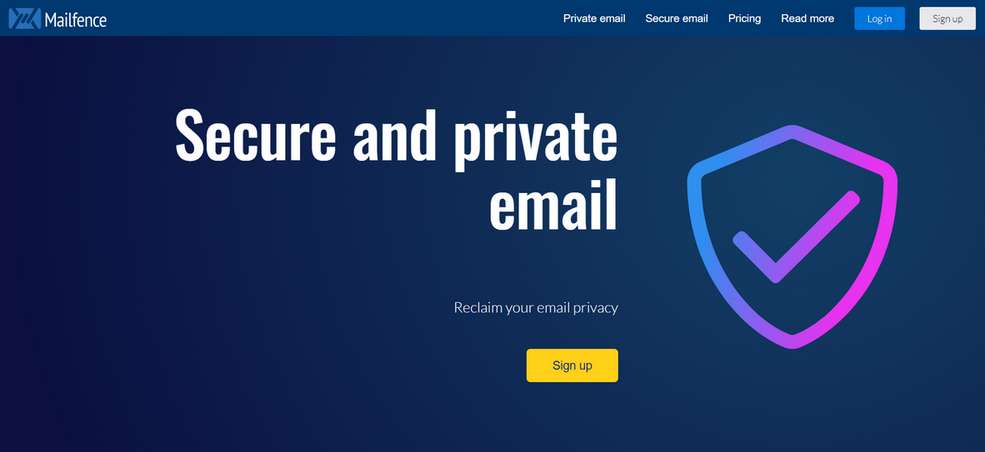
Mailfence, a secure email provider based in Belgium, offers a comprehensive suite of features including a calendar, contacts, file storage, and robust PGP encryption. The core of Mailfence’s security lies in its powerful end-to-end encryption and digital signatures using OpenPGP, ensuring that only the sender and the recipient have access to the communicated content. This level of privacy is crucial for individuals who prioritize the confidentiality of their communications. Operating under the strict data protection laws of Belgium, Mailfence benefits from the stringent oversight of the Belgian Data Protection Authority (DPA), further enhancing the security and privacy of user data. The geographical advantage of being in Belgium provides Mailfence users with a virtual safe for their emails, reinforcing the confidence that their data remains safe and secure.
Despite the emphasis on security, Mailfence manages to maintain a user-friendly interface and accepts cryptocurrency payments, adding an extra layer of privacy for its users. While some data logging, including IP addresses, is part of Mailfence’s transparency commitment, this information is kept for a short duration and is primarily used to ensure service quality and safety. In contrast to other secure email services that may sacrifice features for security, Mailfence offers a balance, making it a compelling alternative to full email and productivity suites such as G Suite or Office 365. In-depth testing reveals Mailfence’s intuitive interface, smooth performance, and responsive email and phone support, positioning it as a versatile and secure choice for users seeking both privacy and functionality.
Pros:
Robust Security Measures: Provides advanced security features, including end-to-end encryption and digital signatures, ensuring the privacy and integrity of communications.
Multi-Platform Accessibility: Accessible through both mobile and web applications, offering flexibility for users on various devices.
Data Storage in Belgium: Ensures data privacy by storing information on servers located in Belgium, benefiting from the country’s strict data protection laws.
Comprehensive Encryption: Utilizes OpenPGP encryption for various elements, including messages, documents, calendar events, contacts, and groups.
Versatile Email Functionality: Supports SMTP, POP, and IMAP protocols, enabling compatibility with a wide range of email clients.
Interoperability: Facilitates synchronization with other email clients, promoting seamless integration for users with multiple accounts.
Enhanced Message Control: Allows for password-protected messages with expiration time, providing an extra layer of control over sensitive information.
Privacy Enhancement: Removes IP addresses from mail headers, contributing to increased user privacy and anonymity.
Secure User Keystore: Incorporates an OpenPGP user keystore, adding an extra layer of security for managing encryption keys.
Updated User Interface: Boasts a recently updated and user-friendly interface, enhancing the overall user experience.
Privacy-Centric Payment Options: Accepts cryptocurrency payments, providing users with an additional layer of privacy during transactions.
Cons:
Data Logging: Involves the logging of IP addresses and some other data, potentially impacting user privacy.
Closed Source Code: The code is not open source, limiting the transparency and collaborative scrutiny that open-source projects often provide.
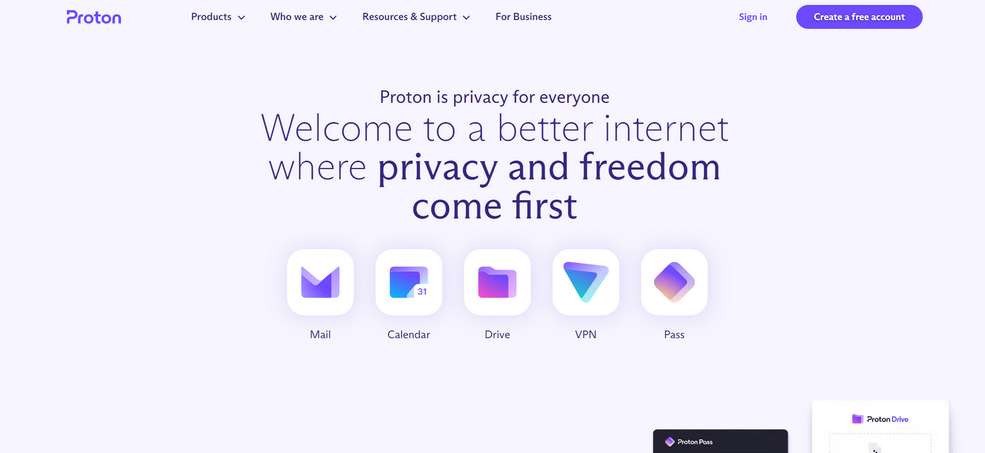
Proton Mail, a Swiss-based email service, has gained acclaim within the privacy community since its establishment in 2014 by a team of academics affiliated with MIT and CERN. Touted as “the only email system the NSA can’t access” in the American media, Proton Mail prioritizes user privacy. Employing PGP encryption standards, it secures emails and stores all messages and attachments encrypted at rest on servers located in Switzerland. Notable features include “self-destructing messages,” address verification, and comprehensive PGP support. Recently, Proton Mail introduced a “Tracking Links Protection” feature, removing tracking pixels from email links to enhance user security.
Proton Mail takes privacy seriously by offering end-to-end and zero-access encryption, ensuring that even the service providers themselves cannot access user content. Despite these robust security measures, certain limitations exist. Proton Mail does not encrypt email subject lines or specific metadata, reflecting inherent constraints of the PGP standard. The search function is restricted to subject lines within the inbox, not the actual content of emails. These functional limitations arise from the integration of encryption and security features. However, Proton Mail provides mobile apps for Android and iOS and allows integration with third-party apps through the Proton Mail Bridge feature, exclusive to paid users. As a well-regarded email provider, Proton Mail offers a secure option for users, particularly those valuing privacy. Switzerland’s standing as a robust privacy jurisdiction, not aligned with surveillance alliances, adds an extra layer of assurance for Proton Mail users.
Pros:
Comprehensive Encryption: Implements end-to-end (E2E) and zero-access encryption for various data types, including Email, Calendar, and Contact information, ensuring a high level of security.
Swiss Jurisdiction: Operates under the privacy-friendly jurisdiction of Switzerland, adhering to stringent data protection laws and enhancing user confidentiality.
Data Storage in Switzerland: All data is securely stored on servers located in Switzerland, contributing to data privacy and protection.
Mobile Apps: Offers dedicated apps for both Android and iOS mobile devices, providing users with a convenient and secure mobile experience.
Open Source Components: The web client, encryption algorithms, and code for both Android and iOS are open source, allowing transparency and collaborative scrutiny for security-minded users.
Custom Domain Support: Provides support for custom domains, allowing users to personalize their email addresses while maintaining a secure environment.
IP Address Stripping: Strips IP addresses from emails, enhancing user privacy by preventing the tracking of sender locations.
Third-Party Compatibility: Supports integration with third-party email clients through the Proton Mail Bridge feature, offering flexibility for users who prefer alternative email platforms.
Contact and Email Import: Facilitates the import of contacts and emails, streamlining the transition for users migrating from other email services.
Cons:
Unencrypted Subject Lines: Does not encrypt email subject lines, presenting a limitation in the overall encryption coverage.
Verification Requirements: May necessitate the provision of personal information for the verification of new accounts, potentially impacting user anonymity during the account creation process.
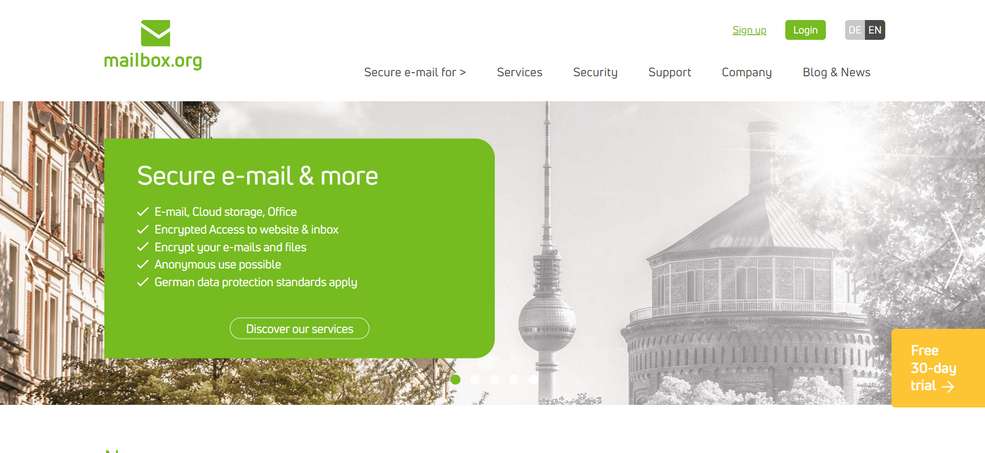
Mailbox.org, a German secure email service, stands out as a compelling option for users seeking both robust security and comprehensive productivity features. Beyond its primary function as a secure email provider, Mailbox.org serves as an all-inclusive productivity suite, akin to Microsoft 365. The platform boasts an extensive lineup of features, encompassing Mail, Calendar, Address Book, Drive (cloud storage), Tasks, Portal, Text, Spreadsheet, Presentation, and Webchat. Despite its wealth of functionalities, Mailbox.org maintains a user-friendly interface with a sharp design, ensuring a seamless and intuitive user experience.
When it comes to balancing features and security, Mailbox.org offers a noteworthy solution. The service provides robust security measures, including full PGP support and the capability to encrypt all data at rest on their secure servers in Germany. This ensures a high level of protection for user data. Moreover, Mailbox.org supports mobile apps and integration with third-party email clients, offering flexibility in how users access and manage their secure email accounts. With affordable plans starting at just €1 per month and a free 30-day trial for those interested in exploring its privacy-focused features, Mailbox.org presents a compelling and accessible option for individuals prioritizing both security and functionality.
Pros:
Versatile PGP Support: Mailbox.org offers PGP support, available either server-side or end-to-end (E2E) through the Mailvelope app, ensuring flexible options for users seeking advanced email encryption.
German Jurisdiction: The company and servers are located in Germany, benefiting from strong privacy protections under German laws, reinforcing user confidentiality.
Enhanced Security Measures: Implements HSTS (HTTP Strict Transport Security) and PFS (Perfect Forward Secrecy) for messages in transit, providing an additional layer of protection against potential security vulnerabilities.
Mitigation of Man-in-the-Middle Attacks: Incorporates safeguards to protect against man-in-the-middle attacks, enhancing the overall security posture of the email service.
Advanced Filtering: Features message and spam filters, along with virus protection, contributing to a secure and streamlined email experience.
Comprehensive Search Functionality: Provides a full-text search capability, allowing users to efficiently locate specific content within their emails.
Diverse Protocol Support: Supports popular email protocols, including POP, IMAP, SMTP, and ActiveSync, ensuring compatibility with a wide range of email clients.
Contact and Calendar Support: Offers vCard, CardDAV, and CalDav support, enabling seamless integration with contacts and calendar applications.
Data Encryption at Rest: Ensures the security of stored data by encrypting messages at rest, safeguarding sensitive information.
Custom Domain Support: Allows users to use custom domains, offering personalized email addresses while maintaining a secure environment.
Mobile Apps for Office Features: Provides mobile apps for some of the Office features, enhancing accessibility and productivity for users on the go.
Open Source Implementation: The platform is open source, allowing users and developers to scrutinize the code for transparency and security assurance.
Cons:
Limited Mobile Email Clients: Lacks dedicated mobile email clients but can be used with third-party email clients, offering a workaround for users seeking mobile compatibility.
Tracking During Registration: Involves some tracking during the registration process, potentially impacting user anonymity during account creation.
Metadata Exposure with PGP Encryption: The use of PGP encryption leaves message subjects and metadata exposed, presenting a limitation in the overall coverage of encryption.
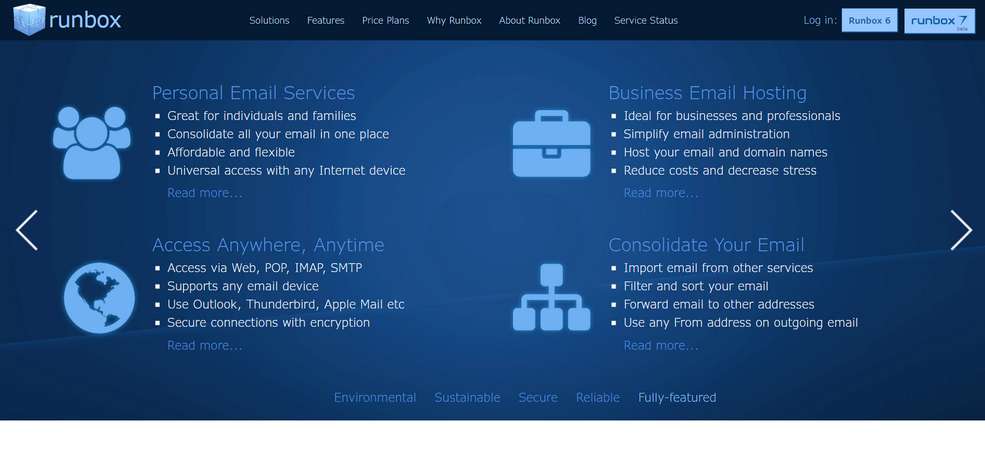
Runbox, a Norwegian company with over two decades of experience in the email business, operates within the secure-email jurisdiction of Norway, benefitting from a robust legal framework for privacy protection. The company places a strong emphasis on security, hosting all its servers in secure data centers powered by clean and renewable hydropower energy. Runbox distinguishes itself by offering users 100 aliases for their accounts and includes secure file storage with various pricing tiers. Supporting SMTP, POP, and IMAP protocols, Runbox is compatible with third-party email clients. Although Runbox 7, their latest webmail service, lacks mobile or desktop clients, continuous improvements have been made since its release over a year ago.
Despite its strengths, Runbox has some limitations. Unlike some competitors, it lacks a built-in option for encrypting the entire mailbox. While PGP can be used with Runbox, it is not seamlessly integrated into the platform. Additionally, the absence of a built-in calendar may be a drawback for users who rely on such features. Nevertheless, Runbox mitigates these concerns by offering a 30-day free trial and providing comprehensive guides for importing existing emails. The company goes above and beyond by offering a 60-day money-back guarantee, allowing users ample time to assess whether the service aligns with their needs before committing to a subscription.
Pros:
Messages sent through Runbox automatically have their IP addresses stripped, enhancing user privacy and security.
Runbox provides a comprehensive suite of services, including Webmail, Contacts, and Files, offering users a versatile and integrated email experience.
The servers powering Runbox operate on renewable energy, showcasing the company’s commitment to environmental sustainability.
Runbox supports a variety of email protocols, including SMTP, POP, and IMAP, ensuring compatibility with various email clients and enhancing user flexibility.
The platform allows seamless synchronization with other email clients, facilitating a smooth user experience across different devices.
Runbox complies with the General Data Protection Regulation (GDPR), ensuring a high standard of data protection and privacy for users.
Operating in Norway, Runbox benefits from strong data protection laws, further bolstering user confidence in the security of their data.
Users enjoy the flexibility of having up to 100 email aliases per mailbox, providing enhanced customization and organization options.
Some paid Runbox accounts offer the option to use custom domain names, catering to users with specific branding or professional needs.
Runbox accepts a wide range of payment methods, including cash and cryptocurrencies, providing users with diverse options for subscription payments.
Cons:
Runbox is browser-based, lacking dedicated desktop or mobile apps, which may limit the convenience and accessibility for users who prefer standalone applications.
The platform is not open source, meaning the source code is not publicly available for scrutiny and modification by the user community.
Data within the Runbox system and at rest is not encrypted, potentially raising concerns about data security, especially for users with high privacy requirements.
Runbox lacks specific features tailored for business use, limiting its appeal for users seeking a comprehensive suite of tools for professional communication and collaboration.
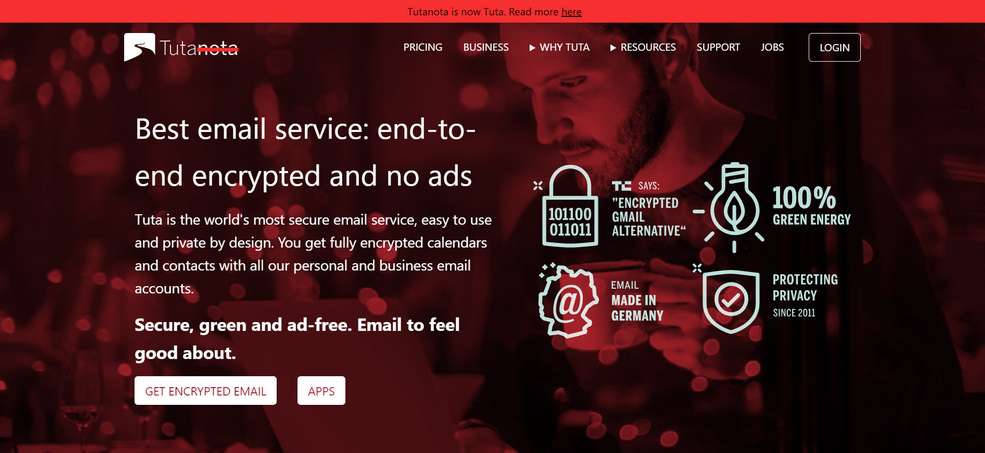
Tuta, a German secure email service, distinguishes itself as a noteworthy player in the realm of secure email providers. Operated by a small team of privacy enthusiasts without external investors or owners, Tuta may not boast the same recognition as Proton Mail but offers a robust hybrid encryption system that addresses some of the limitations of PGP. The platform adheres to the General Data Protection Regulation (GDPR) and other pro-privacy EU regulations, ensuring the protection of users’ privacy rights. Tuta’s commitment to security is evident in its practice of encrypting all messages in the inbox, contacts, and calendar at rest on servers located in Germany.
For users of Tuta, encrypted email communication is facilitated in two ways. When corresponding with another Tuta user, emails are automatically encrypted using asymmetric encryption. In cases where emails are sent to users on different email providers, Tuta employs symmetric encryption by providing a link to the message and a password key for encryption/decryption purposes. Tuta creates an external mailbox for such contacts, ensuring secure and encrypted communication, which proves particularly beneficial for business use. However, Tuta does have its limitations, including the absence of support for PGP, IMAP, POP, or SMTP. Importing existing emails into the encrypted Tuta inbox is not supported. To compensate for the lack of IMAP support, Tuta has developed open-source desktop clients for Windows, Linux, and macOS, providing users with offline access to emails, calendars, and contacts. In essence, Tuta emerges as a transparent and high-security email provider that elevates privacy to a significant level.
Pros:
Tuta ensures comprehensive encryption by securing not only the content of messages but also the Subject lines, Address Book, Inbox Rules and Filters, and Search Index, all of which are encrypted at rest and stored on servers located in Germany.
Users can perform a thorough search within the body of encrypted messages, enhancing the accessibility and usability of the email service.
Tuta allows the sending of encrypted messages to non-users, promoting secure communication beyond its user base.
The platform prioritizes user privacy by automatically stripping the IP address from outgoing emails, reinforcing anonymity in communication.
Tuta provides a versatile user experience with dedicated desktop, mobile, and web applications, ensuring accessibility across various devices.
Transparency is a key feature, as Tuta offers open-source code, extending to both its desktop and mobile applications, allowing users to scrutinize and verify the security of the platform.
Tuta’s encrypted calendar comes with iCard support, providing additional functionality and compatibility for users managing their schedules securely.
The inclusion of encrypted contacts and the integration of Inbox rules with a Spam filter contribute to a comprehensive and secure email management system.
Users can leverage multiple email addresses (aliases), offering flexibility and organization in managing different aspects of communication.
Tuta supports custom domains, enabling users to personalize their email addresses and enhance their professional or branding identity.
Cons:
Tuta does not currently integrate with PGP, limiting compatibility for users who prefer or rely on this encryption standard.
The absence of a mechanism to import existing emails, may pose a challenge for users transitioning to Tuta from other email providers.
Tuta does not work with third-party email clients, potentially limiting the flexibility and customization options for users who prefer alternative email interfaces.

Kolab Now, a private email service headquartered in Switzerland, stands out for its extensive features and comprehensive email suite functionality. A Kolab Now subscription encompasses essential components such as email, contacts, calendars, scheduling tools, collaboration/sharing features, and cloud file storage. Additionally, the platform is currently conducting a public beta for its voice and video conferencing system, expanding its capabilities further. With a focus on catering to business users, teams, and privacy-conscious individuals, Kolab Now positions itself as an excellent choice due to its versatile offerings.
The service provides users with a stylish and user-friendly interface, facilitating easy organization of tasks and communications. Strong cross-platform support ensures seamless usage across computers, tablets, and smartphones, making Kolab Now a flexible solution for users on various devices. Compatibility with popular email clients such as Apple Mail, Outlook, and Thunderbird enhances its accessibility. While Kolab Now boasts numerous features and broad device compatibility, it falls short of providing the highest levels of security. Though it offers end-to-end encryption for emails using Perfect Forward Secrecy and encrypted storage at rest, users seeking top-tier security measures may find alternatives more suitable. Despite its higher-end pricing, Kolab Now remains an attractive option for those desiring a feature-rich email suite hosted in Switzerland.
Pros:
Kolab Now offers the convenience of cryptocurrency payments, providing users with an additional and privacy-oriented payment option.
The platform boasts comprehensive support for email protocols, including POP, SMTP, and IMAP, ensuring compatibility with various email clients and enhancing user flexibility.
Operating under Switzerland’s jurisdiction, Kolab Now benefits from robust privacy protection laws, offering users an additional layer of confidence in the security of their data.
Kolab Now provides a full-fledged email suite equipped with numerous features, making it a viable alternative to widely-used platforms such as Gmail and Office365.
The service caters to diverse user needs, with support for custom domains, making it suitable for individuals, teams, and business users seeking a personalized email experience.
While not built-in, Kolab Now offers end-to-end (E2E) encryption as an option, allowing users to enhance the security of their communications.
Cons:
Email data is not encrypted at rest, but it is stored in a high-security Swiss data center, balancing the lack of encryption with a secure storage environment.
Kolab Now is positioned as a relatively expensive option, which may be a consideration for users seeking more cost-effective email solutions.
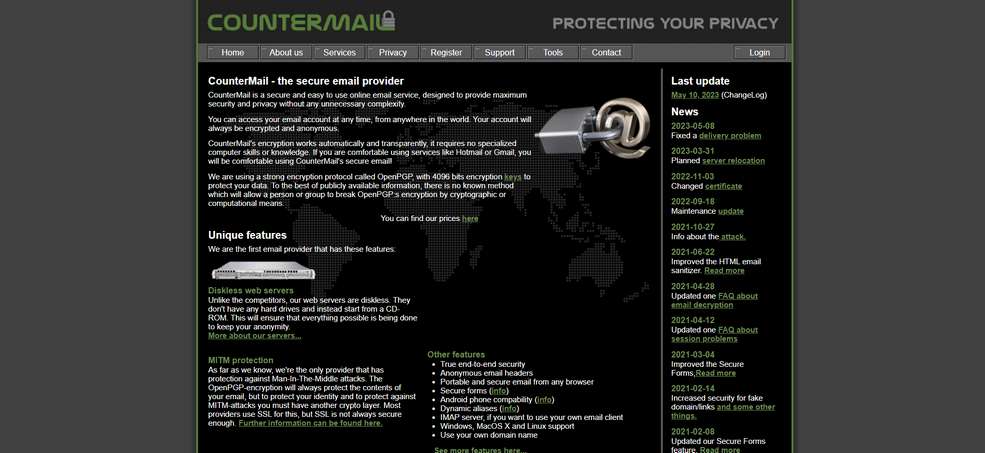
CounterMail, a Swedish-based secure email provider, has been committed to offering the most secure online email service for over 15 years. Their primary goal is to provide users with a highly secure platform supported by excellent free customer support. However, it’s important to note that registering for CounterMail currently requires an invitation from a premium CounterMail user, limiting access to those who are already within the service’s user base.
CounterMail employs OpenPGP encryption with robust 4,096-bit encryption keys to safeguard user communications. Additional layers of security, such as RSA and AES-CBC encryption on top of SSL, protect users from identity leaks and Man-In-The-Middle attacks. Despite not having dedicated mobile or desktop apps, CounterMail prioritizes user privacy by keeping no logs and utilizing diskless servers for mail storage. The service anonymizes email headers, strips sender IP addresses, and stores all emails and attachments encrypted at rest using OpenPGP on servers located in Sweden. While the initial storage capacity is 4GB, users have the option to permanently upgrade this through a one-time payment. Although CounterMail is relatively more expensive than some alternatives, the justification lies in their use of high-quality servers and robust security measures. Despite lacking some frills, CounterMail remains a serious, security-focused email provider with a commendable 15+ year track record.
Pros:
CounterMail supports cryptocurrency payments, providing users with an additional layer of privacy for their transactions.
The platform features a secure, built-in password manager, enhancing overall user security by facilitating robust password management within the email service.
All emails and attachments are stored encrypted on servers located in Sweden, ensuring a high level of data security. Importantly, CounterMail operates on a no-logs policy, further safeguarding user privacy.
The inclusion of custom domain support allows users to personalize their email addresses, catering to both individuals and businesses with specific branding needs.
CounterMail offers message filter and autoresponder features, enhancing email management capabilities and providing users with greater control over their communication.
To protect against identity leaks and Man-In-The-Middle (MITM) attacks, CounterMail utilizes a combination of RSA, AES-CBC, and SSL encryption, reinforcing the overall security of user communications.
Cons:
The design and user interface of CounterMail may feel outdated to some users, potentially impacting the overall user experience.
CounterMail is positioned as a more expensive option compared to other secure email providers, reflecting the costs associated with high-quality servers and robust security measures.
Registration for CounterMail now requires an invitation, limiting accessibility for those who do not have connections within the existing user base.
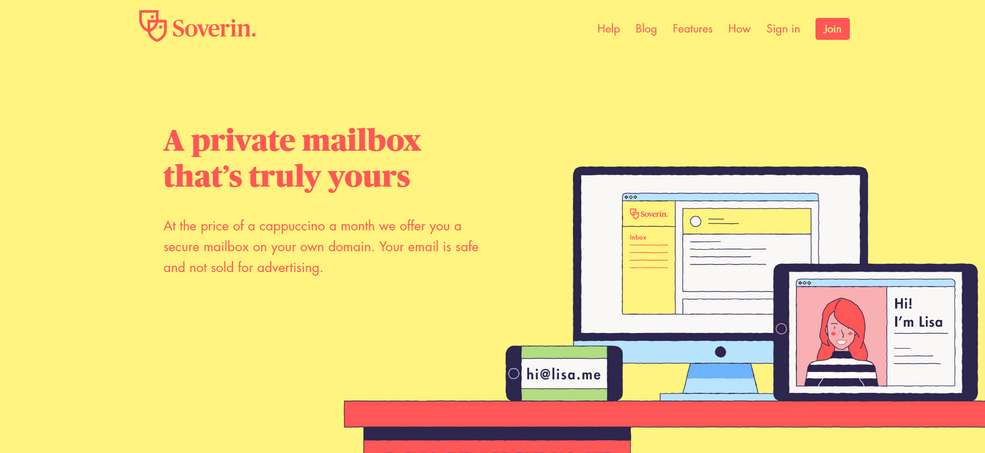
Soverin stands out as a private email service with a clear emphasis on user privacy and data protection. The platform distinguishes itself by offering a straightforward email service that prioritizes simplicity and security. With end-to-end encryption implemented to safeguard user communications, Soverin provides a user-friendly interface that caters to individuals seeking a basic yet secure email solution.
While Soverin may lack the extensive advanced features found in some of its competitors, its commitment to privacy and simplicity positions it as an attractive option for users prioritizing security in their email communication. Although users may not find all the bells and whistles present in other email services, Soverin delivers a no-nonsense, secure platform that streamlines email management. For those who value simplicity and security over an abundance of features, Soverin emerges as a solid and reliable choice in the realm of private email services.
Pros:
Soverin provides a generous 25 GB of data storage for all plans, ensuring users have ample space to manage their emails and attachments.
User data on Soverin is protected under Dutch privacy laws and adheres to the General Data Protection Regulation (GDPR), reinforcing the platform’s commitment to safeguarding user privacy.
The flexibility of Soverin extends to its compatibility with third-party email clients, allowing users to integrate the service seamlessly with their preferred email applications.
Cons:
Soverin lacks custom mobile apps, potentially limiting the convenience and accessibility of the platform for users who prefer dedicated applications for mobile devices.
The platform is not open source, meaning the source code is not publicly available for scrutiny and modification by the user community, which may be a consideration for users who prioritize transparency.
Soverin does not offer built-in encryption options, potentially leaving users who seek additional layers of security to explore alternative solutions.
Choosing a secure email provider that relies on open-source software is a prudent decision for those prioritizing security and reliability. By utilizing open-source software, these providers enable public review and verification of encryption protocols and privacy protections, fostering transparency and trust in their services. This approach ensures that the inner workings of the email service are subject to scrutiny by the wider community, contributing to a more robust and accountable security framework. Whether you are an individual, a business professional, or anyone concerned about privacy, transitioning to a secure and private email service becomes a crucial step in enhancing your digital privacy. Notably, major email providers such as Gmail, Yahoo, and Microsoft may not always prioritize user privacy, necessitating a proactive approach to safeguarding personal information.
In contrast to the conventional free email services, opting for a paid secure email service means you are not compromising your privacy as a trade-off for the service. Recognizing that “free” services often come at the cost of user data and privacy, investing in a secure email provider ensures that your personal information is not exploited for advertising or other purposes. The payment for these secure email services contributes to maintaining the integrity of your digital communications without the inherent risks associated with relying on free alternatives. This shift to paid secure email services signifies a conscious choice to prioritize personal privacy and security over the convenience of free offerings.
Maybe you liked other interesting articles?

